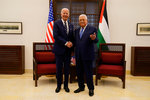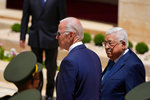


BETHLEHEM, West Bank (AP) — President Joe Biden, visiting the West Bank on Friday, restated his continued support for “two states for two peoples” but acknowledged that the “ground is not ripe” for reviving stalled talks aimed at achieving an elusive peace between Israelis and Palestinians.
His comments came during a joint appearance in Bethlehem with Palestinian Authority President Mahmoud Abbas, where he announced $201 million for a United Nations agency that supports Palestinian refugees.
“The Palestinian people are hurting now,” Biden said. “You can just feel it. Your grief and frustration. In the United States, we can feel it.”
Biden said they “deserve a state of their own that’s independent, sovereign, viable and contiguous. Two states for two peoples, both of whom have deep and ancient roots in this land, living side by side in peace and security.”
Although such a goal “can seem so far away,” he said he wouldn't give up on the peace process.
“Even if the ground is not ripe at this moment to restart negotiations, the United States and my administration will not give up on bringing the Palestinians and the Israelis, both sides, closer together,” he said.
Abbas, in his own remarks, said “the key to peace” in the region “begins with ending the Israeli occupation of our land.” He said Israel “cannot continue to act as a state above law."
Earlier Friday, Biden appeared in east Jerusalem at the Augusta Victoria Hospital, which serves Palestinians, to discuss financial assistance for local healthcare. He proposed $100 million, which requires U.S. congressional approval, plus smaller amounts for other assorted programs.
Israel has also committed to upgrading wireless networks in the West Bank and Gaza, part of a broader effort to improve economic conditions.
“Palestinians and Israelis deserve equal measures of freedom, security, prosperity, and dignity,” he said at the hospital. “And access to healthcare, when you need it, is essential to living a life of dignity for all of us.”
The last serious round of negotiations aimed at creating an independent Palestinian state broke down more than a decade ago, leaving millions of Palestinians living under Israeli military rule.
Israel’s outgoing government has taken steps to improve economic conditions in the occupied West Bank and Gaza. But Yair Lapid, the caretaker prime minister, has no mandate to hold peace negotiations. Upcoming elections in November could also bring to power a government that is opposed to Palestinian statehood.
Meanwhile, the 86-year-old Abbas, whose Palestinian Authority administers parts of the occupied West Bank and cooperates with Israel on security, is more representative of the status quo than Palestinian aspirations.
His Fatah party lost an election, and control of Gaza, to the Islamic militant group Hamas more than 15 years ago. He called off the first national elections since then last year — blaming Israel — when Fatah appeared to be heading for another crushing defeat. Polls over the past year have consistently found that nearly 80% of Palestinians want him to resign.
Biden acknowledged earlier during the trip that a two-state solution won't happen “in the near-term.”
Palestinian leaders also fear being further undermined by the Abraham Accords, a diplomatic vehicle for Arab nations to normalize relations with Israel despite the continuing occupation. Biden, who arrives in Saudi Arabia later Friday to attend a summit of Arab leaders, hopes to broaden that process, which began under former President Donald Trump.